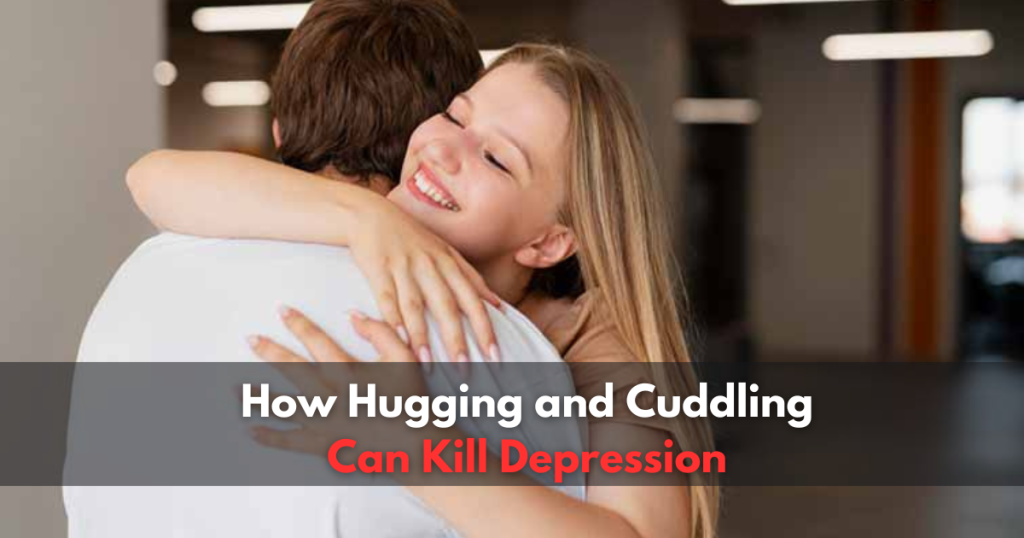Depression is a serious mental health issue. It affects millions worldwide. It harms relationships, productivity, and quality of life. Therapy and medication are common. But new studies show that physical touch, especially hugging, can reduce depression. This article looks at how simple, comforting acts affect mental health. It offers science, benefits, and tips on adding more affectionate touch to daily life.
The Science of Touch and Mental Health

How Physical Touch Affects the Brain
Touch is biological. It is key to regulating emotions. When we experience a hug or a cuddle, the brain releases oxytocin, often referred to as the “love hormone.” This hormone reduces stress, lowers blood pressure, and decreases cortisol, a stress-related hormone. Dopamine and serotonin are neurotransmitters that regulate mood. They are also stimulated, providing a natural mood boost.
Evolutionary Background of Physical Affection
Touch is key to human bonding and survival. It has been since our evolution. Touch among social groups builds trust and cooperation. These are vital for human survival. A lack of touch can cause feelings of isolation and loneliness. These feelings are linked to depression.
How hugging and cuddling can ease the symptoms of depression.

Reducing Stress and Anxiety
Researchers have proven that physical affection, particularly hugging and cuddling, significantly reduces stress. Hugging or cuddling activates our parasympathetic nervous system. It helps us relax and feel safe. This calming effect relieves the tension and anxiety of depression. It offers a quick, effective way to feel better.
Boosting Self-Worth and Emotional Connection
Depression frequently comes with feelings of worthlessness or loneliness. Hugging and cuddling can help. They boost feelings of connection and belonging. Even short interactions can boost self-worth. Being held by another person can remind us of our value and importance.
Enhancing Sleep Quality
Sleep disturbances are common among individuals with depression. Cuddling before sleep improves sleep quality. It lowers cortisol and boosts melatonin, a sleep-regulating hormone. Quality sleep is crucial for mental health. It promotes emotional stability, focus, and resilience.
The Physical and Mental Benefits of Hugging and Cuddling

1. Releases “feel-good” hormones.
-
Oxytocin: The “cuddle hormone.” It strengthens bonds, reduces stress, and promotes relaxation.
-
Endorphins: They are released during a warm embrace. They are natural painkillers. They provide comfort and happiness.
-
Serotonin and dopamine are mood-regulating neurotransmitters. They help reduce sadness and improve mental well-being.
2. Lowers Blood Pressure and Heart Rate
Cuddling and hugging stimulate skin’s pressure receptors. They send calming signals to the brain. They can reduce heart rate, lower blood pressure, and improve heart health and They also lessen the physical symptoms of depression.
3. Improves immunity
Studies say that frequent hugging may even strengthen the immune system. Physical affection reduces stress and supports the nervous system. It helps prevent illnesses and boosts resilience, both physical and mental.
4. Promotes mindfulness and emotional presence.
Physical affection encourages mindfulness by grounding individuals in the present moment. “Being present” is valuable for those with depression. It helps break the cycle of rumination and negative thoughts.
Practical Ways to Integrate Hugging and Cuddling for Mental Health

Make Hugging a Routine
Hug your loved ones daily. It could be a morning embrace or a comforting gesture before bed. Consistency helps to solidify this bonding behavior. It will make it a natural part of your mental wellness routine.
Cuddle with pets.
Not everyone has access to human touch, but pets can offer similar benefits. Cuddling a pet can reduce loneliness. It releases oxytocin, too. This provides comfort and companionship for those with depression.
Invest time in self-care (cuddling).
If you live alone or have little contact, try a weighted blanket or body pillow. They can mimic the comfort of a hug. Weighted blankets are popular for their calming effects. They simulate a “cuddle” and promote relaxation.
Socialize with purpose.
Going to social events or support groups can create chances for physical interaction. Many group therapies and support settings value supportive touch. This can be a pat on the back or a comforting hug.
The Long-Term Effects of Hugging and Cuddling on Depression
)
Strengthening Social Bonds and Reducing Loneliness
Depression often isolates individuals, making them feel alone in their struggles. Regular physical affection reduces isolation. It helps connect with friends and family. Strong social bonds are a support system during tough times. They provide mental and emotional relief.
Promoting Emotional Resilience
Frequent affection can build resilience. It helps people handle stress better. Love and support help us manage tough times. They reduce the long-term effects of depression.
Facilitating Recovery from Trauma
Hugging and cuddling may also play a role in healing emotional wounds. For those with trauma, safe physical affection can help. It can restore trust and security. These are key to healing and building a healthier mindset.
Expert opinions and scientific studies support physical affection for mental health.

Study on Oxytocin and Emotional Health
A UNC study found that brief hugs between couples. They increased oxytocin and reduced stress. These findings show that hugging and cuddling can boost emotional health. They are a simple, natural addition to traditional mental health treatments.
Psychologists on Touch Therapy
Psychologists and therapists support “touch therapy” to treat depression. They see it as a helpful addition to standard treatments. Touch therapy uses safe, consensual contact to comfort people. It helps to release tension and improve emotional well-being. Dr. Tiffany Field, a top touch therapy researcher, says that human touch stimulates the vagus nerve. It helps regulate stress and emotional health.
Comparing physical affection to traditional treatments.
Therapy and medication are often essential. But, physical affection is a natural, accessible way to boost mental health. Experts say that adding hugs and cuddles to traditional treatments may help. It could boost outcomes by tackling both the emotional and physical parts of depression.
Final Thoughts: The Role of Physical Affection in Killing Depression
Hugging and cuddling may not “cure” depression. But, they can provide relief. Physical affection has many benefits. It reduces stress, improves mood, and boosts sleep. It also strengthens connections. These effects make it a powerful tool against depression. For those seeking natural ways to boost their mental health, daily hugs and cuddles are a simple, effective step.
Conclusion: Embrace the Power of a Hug
In a world where depression is common, we must value touch’s healing power. The science is clear: hugging and cuddling are good for you. They release hormones that improve health and boost emotional bonds. These effects can help reduce depression. So, the next time you’re feeling down or notice a loved one struggling, remember the value of a warm, caring embrace. A simple hug or a cuddle might be what’s needed to lighten the load and bring a sense of comfort and peace.


